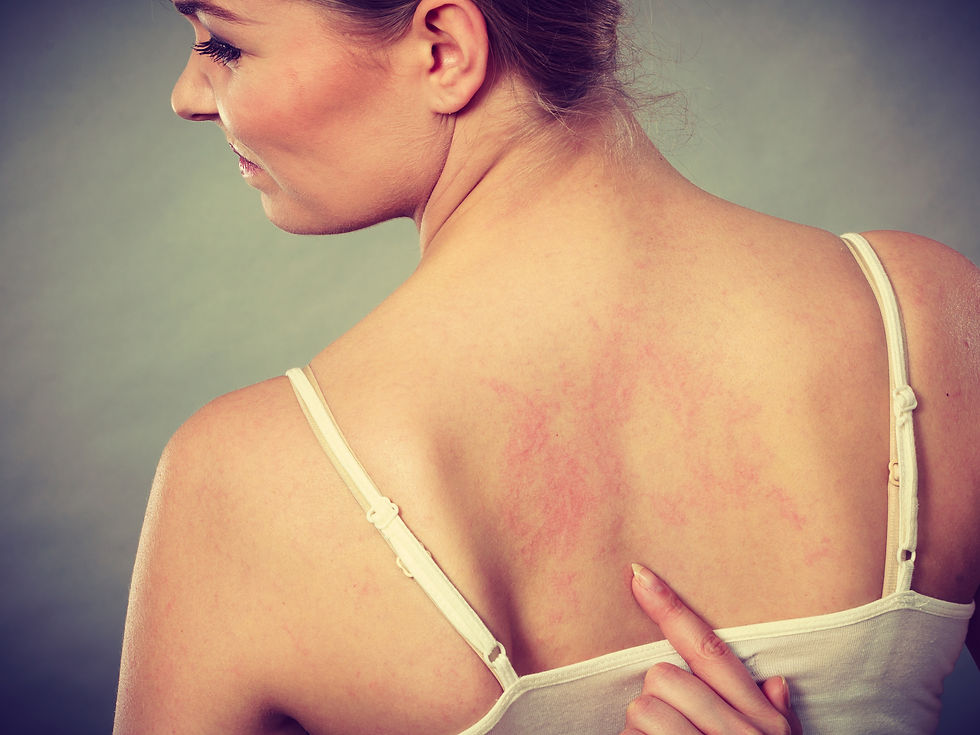Acupuncture for Eczema and Dermatology: An Effective Holistic Approach
- www.Acute-Acupuncture.com

- Nov 22, 2023
- 3 min read
Updated: Apr 19, 2024

Eczema, a chronic inflammatory skin condition, affects millions of people worldwide and has become a significant concern in dermatology. Traditional treatments often involve topical ointments, corticosteroids, and other medications, which may not always provide satisfactory results or may come with adverse side effects. In recent years, acupuncture has gained attention as a potential complementary therapy for eczema and various dermatological conditions. This Blog Post will explore the principles underlying acupuncture, its effectiveness in treating eczema, and its broader applications in dermatology.
Principles of Acupuncture: Acupuncture, a therapeutic technique from ancient Chinese medicine, targets the body's energy pathways known as meridians (neuropathways). According to Traditional Chinese Medicine (TCM), conditions like eczema occur due to imbalances, blockages, or stagnation within these meridians, resulting in disordered bodily functions. Acupuncture aims to restore the body's equilibrium or promote homeostasis by applying fine needles to specific acupuncture points along these meridians, thereby reducing inflammation, relieving symptoms, and promoting healing.
Effectiveness of Acupuncture for Eczema: Numerous studies have explored the efficacy of acupuncture in treating eczema, showcasing promising results. Acupuncture is believed to stimulate the release of endorphins, which act as natural painkillers, reducing the sensation of itching and relieving discomfort associated with eczema. Additionally, acupuncture has been shown to regulate immune and inflammatory responses, promoting a balanced immune system, which may be crucial in managing eczema flare-ups. Research conducted by Yunhee Kim et al. (2018) demonstrated that acupuncture, when used as an adjunct to conventional therapy, significantly reduced eczema severity and improved the quality of life for patients. Similarly, a systematic review by Pfab et al. (2012) concluded that acupuncture positively affected itch intensity, eczema area, and overall symptomatology.
Additional Dermatological Applications: Beyond its potential for eczema treatment, acupuncture boasts a broad range of dermatological applications. It has shown promise in treating various skin conditions such as psoriasis, urticaria, pruritus, and acne. Acupuncture modulates immune responses, regulates hormonal imbalances, and promotes better circulation, contributing to improved dermatological health.
Safety and Side Effects: Acupuncture is generally considered a safe therapy when performed by trained, registered, or licensed practitioners. The risk of adverse effects is minimal, with the most commonly reported being mild bruising, temporary sensitivity, or localized pain at the needle insertion sites. Compared to pharmaceutical interventions that treat the symptoms, acupuncture offers a more holistic and less invasive approach that prioritizes the body's natural healing mechanisms.
Acupuncture presents a promising and effective therapeutic option for managing eczema and various dermatological conditions. Its ability to regulate immune responses, reduce inflammation, and alleviate symptoms makes it an attractive complementary therapy in conjunction with traditional treatments. Integrating acupuncture into dermatological practice can potentially enhance patient outcomes, providing a more comprehensive and holistic approach to your skin health. After treatments, one may feel relaxed, energized, and rejuvenated. Communicating with your practitioner about your experience is essential to ensure you receive the maximum benefits from these treatments. Click the button below and book a complementary 15-minute consultation at Acute Acupuncture, 163 The Terrace, Wellington Central, Wellington. Let's discuss if acupuncture is the right thing for you. Thank you for taking the time to read this Blog Post. Don't forget to like, subscribe, and share this post with others. If you have any questions or concerns, check out Acute-Acupuncture Wellington Frequently Asked Questions (FAQs), as we find this helps answer most people's questions. Please leave a comment below.











Comments